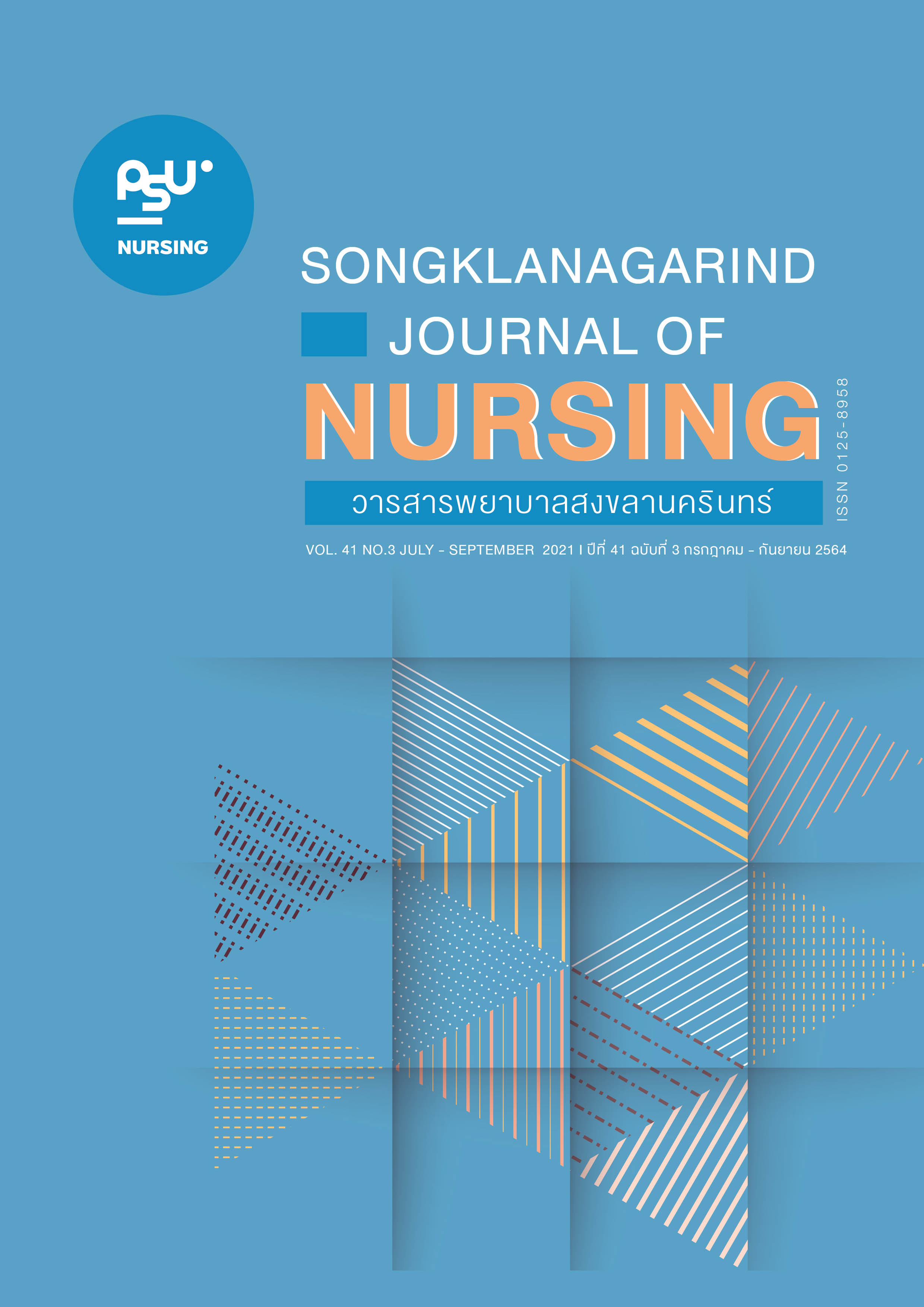การพัฒนาโปรแกรมส่งเสริมความกตัญญูสำหรับนักศึกษาพยาบาล: การศึกษานำร่อง
Main Article Content
บทคัดย่อ
วัตถุประสงค์: การวิจัยเชิงพัฒนานี้มีวัตถุประสงค์เพื่อพัฒนาโปรแกรมส่งเสริมความกตัญญูสำหรับนักศึกษาพยาบาล วิธีการ: ขั้นตอนการพัฒนาโปรแกรม แบ่งออกเป็น 2 ระยะ ระยะที่ 1 การพัฒนาโปรแกรม ประกอบด้วย 3 ขั้นตอน ได้แก่ 1) การวิเคราะห์สถานการณ์ปัญหาของนักศึกษาพยาบาลและองค์ความรู้ที่มีอยู่ 2) การสืบค้นและประเมินคุณค่าของหลักฐานเชิงประจักษ์ และ 3) การออกแบบชุดกิจกรรมการส่งเสริมความกตัญญู ระยะที่ 2 การตรวจสอบคุณสมบัติของโปรแกรม ประกอบด้วย การตรวจสอบความตรงเชิงเนื้อหา และความเป็นไปได้ในการนำไปใช้ ผลการศึกษา: ผลการวิจัย พบว่า โปรแกรมที่พัฒนาขึ้นมี 2 องค์ประกอบ คือ 1) คู่มือการดำเนินกิจกรรมโปรแกรมส่งเสริมความกตัญญูสำหรับนักศึกษาพยาบาล และ 2) สมุดบันทึกประจำวัน (daily diary) การดำเนินกิจกรรมแบ่งเป็น 4 ขั้นตอน ได้แก่ 1) ขั้นเตรียมความพร้อม 2) ขั้นดำเนินการ ประกอบด้วย กิจกรรมการส่งเสริมความกตัญญู 4 ประการ คือ (1) การส่งเสริมความกตัญญูต่อตนเองโดยการวาดรูปสื่อความหมายถึงตนเอง (2) การส่งเสริมความกตัญญูต่อพ่อแม่ ครู อาจารย์ และผู้มีพระคุณ โดยการเขียนจดหมายถึงคนที่ฉันรัก (3) การส่งเสริมความกตัญญูต่อเพื่อนโดยการบอกเล่าเรื่องประทับใจเกี่ยวกับเพื่อน และ (4) การส่งเสริมความกตัญญูต่อผู้ป่วยโดยบอกเล่าประสบการณ์ความประทับใจเกี่ยวกับผู้ป่วย 3) ขั้นติดตาม และ 4) ขั้นประเมินผล อภิปรายผล: ผลการประเมินคุณภาพของโปรแกรมโดยการตรวจสอบความตรงเชิงเนื้อหา พบว่า โปรแกรมมีความถูกต้อง เหมาะสม และการนำไปทดลองใช้กับนักศึกษาพยาบาล จำนวน 10 คน พบว่า โปรแกรมสามารถนำไปปฏิบัติได้จริง อย่างไรก็ตามนักศึกษาได้เสนอให้ปรับสื่อบางส่วนเพื่อให้มีเนื้อหาที่เฉพาะเจาะจงกับนักศึกษาพยาบาลมากขึ้น ทั้งนี้ควรนำโปรแกรมไปทดสอบประสิทธิภาพและประสิทธิผลกับจำนวนกลุ่มตัวอย่างที่มากขึ้น
Article Details
เอกสารอ้างอิง
Arpanantikul M, Pratoomwan A. Clinical learning experiences of second-year Thai nursing students: A phenomenological study. Pacific Rim Int J Nurs Res. 2017; 21(2): 121-34.
Ruangpermpoon K, Rongmuang S, Nintachan P. Characteristics of social adjustment in nursing students.
Rama Nurs J. 2011; 17(3): 478-92. Thai.
Faculty of Nursing, Prince of Songkla University. Minutes of the meeting of the working group to strengthen students’ mental strength. Songkhla: Faculty of Nursing, Prince of Songkla University; 2018.
Saito AS, Voraharn W, Senarak W. Happiness of undergraduate nursing students. Journal of Nursing Science
and Health. 2011; 34(2): 70-9. Thai.
Thaweekoon T, Nintachan P, Sangon S. Factors predicting stress in Graduate Nursing Students. NJPH. 2013; 22(3): 1-11. Thai.
Phothidara Y. Nursing education management: For student generation Y. Journal of Nursing Science and Health. 2011; 34(2): 61-9. Thai.
Emmons RA, Stern R. Gratitude as a psychotherapeutic intervention. J Clin Psychol. 2013; 69(8): 846-55.
doi: 10.1002/jclp.22020.
Balthip Q, Purnell JM. Pursuing meaning and purpose in life among Thai adolescents living with HIV: A grounded theory study. J Assoc Nurses AIDS Care. 2014; 4(25): e27-38. doi: 10.1016/j.jana.2014.03.004.
Balthip K, Petchruschatachart U, Piriyakoontorn S, et al. Purpose in life among Thai junior high school adolescents. Songklanagarind J Nurs. 2017; 37(Suppl): 89-97. Thai.
Waters L. Predicting job satisfaction: Contributions of individual gratitude and institutionalized gratitude.
Psychology. 2012; 3(12A): 1174-6. doi: 10.4236/psych.2012.312A173.
Emmons RA. Queen of the virtues? Gratitude as human strength. Reflective practice: Formation and supervision in ministry; 2012.
Froh JJ, Emmons RA, Card NA, et al. Gratitude and the reduced costs of materialism in adolescents. J Happiness Stud. 2011; 12(2): 289-302. doi: 10.1007/s10902-010-9195-9.
Zhang MX, Mou NL, Tong KK, et al. Investigation of the effects of purpose in life, grit, gratitude, and school
belonging on mental distress among Chinese emerging adults. Int J Environ Res Public Health. 2018; 15(10):
doi: 10.3390/ijerph15102147.
Lin CC. The relationships among gratitude, self-esteem, depression, and suicidal ideation among undergraduate students. Scand J Psychol. 2015; 56(6): 700-7. doi: https://doi.org/10.1111/sjop.12252.
Chen LH, Chen MY, Tsai YM. Does gratitude always work? Ambivalence over emotional expression inhibits the beneficial effect of gratitude on well-being. IJP. 2012; 47(5): 381-92.
Balthip Q, Chandrema S. Process of Establishing Purpose of Life of Thai Teenagers living with HIV. Songklanagarind J Nurs. 2013; 33(3): 1-16. Thai.
Balthip K, Petchruschatachart U, Piriyakoontorn S, et al. Application of purpose in life and self-sufficient economic philosophy in enhancing the holistic health promotion of Thai adolescents. Songklanagarind J Nurs. 2016; 36(3): 111-28. Thai.
Balthip K, Petchruschatachart U, Piriyakoontorn S, et al. Application of the purpose in life model for enhancing holistic health promotion of Thai adolescents living with HIV. Songklanagarind J Nurs. 2018; 38(4): 49-67. Thai.
Balthip K, McSherry W, Petchruschatachart U, et al. Enhancing life purpose amongst Thai adolescents.
J Moral Educ. 2017; 46(3): 295-307. doi: 10.1080/03057240.2017.1347089.
Lomas T, Froh JJ, Emmons RA, et al. Gratitude interventions. The Wiley Blackwell handbook of positive psychological interventions; 2014.
The Joanna Briggs Institute Levels of Evidence and Grades of Recommendation Working Party. JBI Grades of Recommendation [Internet]. 2014 [cited 2019 Jun 18]. Available from: https://joannabriggs.org/sites/default/files/2019-05/JBI-grades-ofrecommendation_2014.pdf
Noor NM, Rahman ND, Zahari MI. Gratitude, gratitude intervention and well-being in Malaysia. TJBS. 2018; 13(2): 1-8.
Kreitzer MJ, Telke S, Hanson L, et al. Outcomes of a gratitude practice in an online community of caring. J Altern Complement Med. 2019; 25(4): 385-91. doi: 10.1089/acm.2018.0460.
Polit DF, Beck CT. Nursing Research: Principle and methods. 7 th ed. Philadelphia: Lippincott Williams &
Wilkins; 2004.
Leawarin U. Research and development of the gratitude training module enhancing the gratitude, responsibility and learning outcomes of the Suan Sunandha Rajabhat university students. Research and Development Journal Suan Sunandha Rajabhat University. 2012; 4: 1-16. Thai.
Rash JA, Matsuba MK, Prkachin KM. Gratitude and wellbeing: Who benefits the most from a gratitude intervention?. Applied Psychology Health and Well-Being. 2011; 3(3): 350-69. doi: 10.1111/j.1758-0854.2011.01058.x.
Khanna P, Singh K. Effect of gratitude educational intervention on well-being indicators among North Indian adolescents. Contemp School Psychol. 2016; 20(4): 305-14. doi: 10.1007/s40688-016-0087-9.
O’Connell BH, O’Shea D, Gallagher S. Examining psychosocial pathways underlying gratitude interventions: A randomized controlled trial. J Happiness Stud. 2018; 19(8): 2421-44. doi: http://doi.org/10.1007/s10902-017-9931-5.
O’Leary K, Dockray S. The effects of two novel gratitude and mindfulness interventions on well-being. J Altern Complement Med. 2015; 21(4): 243-5. doi: 10.1089/acm.2014.0119.
Schache KR, Hofman PL, Serlachius AS. A pilot randomized controlled trial of a gratitude intervention for adolescents with Type 1 diabetes. Diabet Med. 2020; 37(8): 1352-6.
Al-Seheel AY, Noor NM. Effects of an Islamic-based gratitude strategy on Muslim students’ level of happiness. Mental Health, Religion & Culture. 2016; 19(7): 686-703. doi: 10.1080/13674676.2016.1229287.


